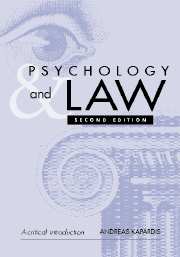Book contents
- Frontmatter
- Contents
- List of case studies
- Acknowledgements
- Foreword
- 1 Psycholegal research: an introduction
- 2 Eyewitnesses: key issues and event characteristics
- 3 Eyewitnesses: the perpetrator and interviewing
- 4 Children as witnesses
- 5 The jury
- 6 Sentencing as a human process
- 7 The psychologists as expert witnesses
- 8 Persuasion in the courtroom
- 9 Detecting deception
- 10 Witness recognition procedures
- 11 Psychology and the police
- 12 Conclusions
- Notes
- References
- Author index
- Subject Index
2 - Eyewitnesses: key issues and event characteristics
Published online by Cambridge University Press: 05 December 2011
- Frontmatter
- Contents
- List of case studies
- Acknowledgements
- Foreword
- 1 Psycholegal research: an introduction
- 2 Eyewitnesses: key issues and event characteristics
- 3 Eyewitnesses: the perpetrator and interviewing
- 4 Children as witnesses
- 5 The jury
- 6 Sentencing as a human process
- 7 The psychologists as expert witnesses
- 8 Persuasion in the courtroom
- 9 Detecting deception
- 10 Witness recognition procedures
- 11 Psychology and the police
- 12 Conclusions
- Notes
- References
- Author index
- Subject Index
Summary
‘A witness to a crime is expected, as a civic duty, to report the crime to the police … At a later date the witness may be asked to give oral evidence in court about what he may have seen, and answer questions during cross-examination by the defence.’ (Home Office, 1998:19)
‘Testimony to personal identity is proverbially fallacious.’ (William James, 1890:97)
‘Although such testimony is frequently challenged, it is still widely assumed to be more reliable than other kinds of evidence. Numerous experiments show, however, that it is remarkably subject to error.’ (Buckhout, 1974:23)
‘Human memory is a fragile and elusive creature. It can be supplemented, partially restructured, or even completely altered by post-event inputs. It is susceptible to the power of a simple word. This is not to imply that all memories are changed and no original memories remain intact.’ (Loftus and Ketcham, 1983:168–9)
‘Nowhere are the problems of generalizability and reliability of research findings more acute than in the study of eyewitnessing.’ (Davies, 1992:265)
‘It is important not to exaggerate the fallibility of human memory. Memory is often wonderfully detailed and accurate.’ (Lindsay and Read, 1994:293)
Introduction
The above quotes reflect the concern over the years with the limitations of eyewitness testimony, the more recent acceptance of the fact that the whole process of observing and recalling faces and events is a complex, interactive and dynamic one and, finally, that we should not overlook the fact that such testimony can be accurate.
- Type
- Chapter
- Information
- Psychology and LawA Critical Introduction, pp. 21 - 48Publisher: Cambridge University PressPrint publication year: 2002



